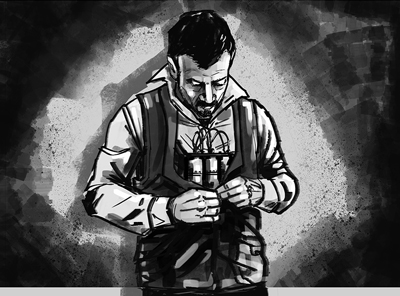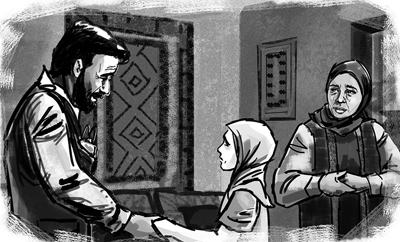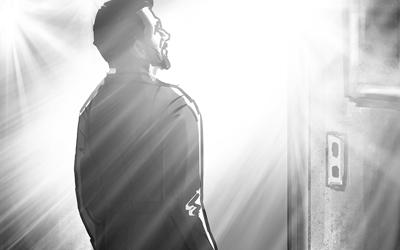If the Apostle Paul is one of the main characters of the book of Acts, then Acts 21 is one of the most pivotal chapters in his life. Up until Acts 21, Paul was a free man and had done an incredible amount of work to win souls and establish churches throughout the part of the world he was from. From Acts 21 on, he was a Roman prisoner. This focus on the life of Paul was the main subjects of our live class audio on Acts 21. The recording can be heard here.
In our class we discussed how we found that the Holy Ghost was clearly speaking to Paul through prophets that “he should not go up to Jerusalem” (Acts 21:4). And unlike other times in the Bible where Paul was very yielded and sensitive to God’s voice and will, it seems here his steadfastness and zeal was at cross purposes with the revealed will of God in His life.
Reacting to the plea of the brethren not to go up to Jerusalem, after a prophet had again warned Paul of his plans, Paul said, “What do you mean to weep and break my heart? I am ready to die at Jerusalem.” (Acts 21:13) Very commendable indeed and Paul was such a light and testimony to his generation and to all generations after that. But it seems in this case his willingness to lay down his life as a martyr interfered with God’s specific instructions for him to not proceed in the direction he was going.
We talked briefly before the class started on what it might have been that caused Paul to miss the Lord’s highest and best, what He was leading. For David it was Bathsheba, for Samson it was Delilah. But with Paul, it seemed to be something totally different.
Rather than being a “traditional” temptation like a woman, alcohol or something like that, it seems it had to do with Paul’s loyalty to his physical nation and Jewish heritage that caused him to miss what the Lord was calling him to do at that time, which was to remain true to the calling of God in his life to be a light to the Gentiles.
And on another subject we discussed in our class (when we got to the place in the chapter about Philip the evangelist and his 4 daughters that prophesied) about prophets and prophetesses of the early church and of the culture of those times, as well as the verse, “On my servants and on my handmaidens I will pour out in those days of My Spirit and they shall prophesy.” (Acts 2:18)
That of course raises the question of where Paul wrote, “Let the women keep silent in the churches.” (I Corinthians 14:34) How can the women keep silence in the churches if God has poured out His Spirit on them and given them the gift of prophecy? Which then led on to a large discussion about women in the Bible and the different ones who’d been used of God in Bible times, Deborah, Ester, Rehab the harlot and others.
So in Jerusalem Paul ran into something that had been coming on all the time and growing, but he’d been far away from it. James and the elders of the church in Jerusalem told him, “Thou seest, brother, how many thousands of Jews there are which believe; and they are all zealous of the law.” (Acts 21:20)
Zealous of the laws of Moses? Do think those Christians he’d just left in Ephesus or the ones in Corinth and Philippi were zealous of the law? In case you don’t know the answer to this, it’s “no”.
This small blog article won’t suffice for space to delve into the very deep implications of those Jews who’d been converting to faith in Jesus in Jerusalem but were still fully holding on to the Jewish laws of Moses. But we did get into this more in our live audio class. For those who don’t know about this, this subject of whether Christians are obligated to keep the Mosaic Law is one of the most continuous issues there is, certain among many Christians today and it’s been that way off and on for 2000 years.
This is one of the somewhat longer live classes we had and the reason may be that it contains some of the most significant, personal and far reaching lessons in the book of Acts that we can see and learn from concerning Paul’s life and even his mistakes.
There’s more. Actually there are passages in this chapter and the next that are some of the most heart breaking in the Bible and to me reveal the heart of God and of Jesus, more than almost anything anywhere else does. We talked about this towards the end of our study. I hope you’ll have the time and a chance to listen to the class, it can be heard here.
God bless you, thanks for your prayers and the comments some of you have sent.
Your friend in Him, Mark




 I know a man who lives in [West Europe] who used to be a “hodja”. That is a Muslim priest (you know, those who serve in a mosque and sing in Arabic). He has a wonderful testimony of how he became a Christian.
I know a man who lives in [West Europe] who used to be a “hodja”. That is a Muslim priest (you know, those who serve in a mosque and sing in Arabic). He has a wonderful testimony of how he became a Christian.




















 But they showed me verse after verse from the Bible to answer my questions and to show me that I needed to receive Jesus and to be born again.
But they showed me verse after verse from the Bible to answer my questions and to show me that I needed to receive Jesus and to be born again.











